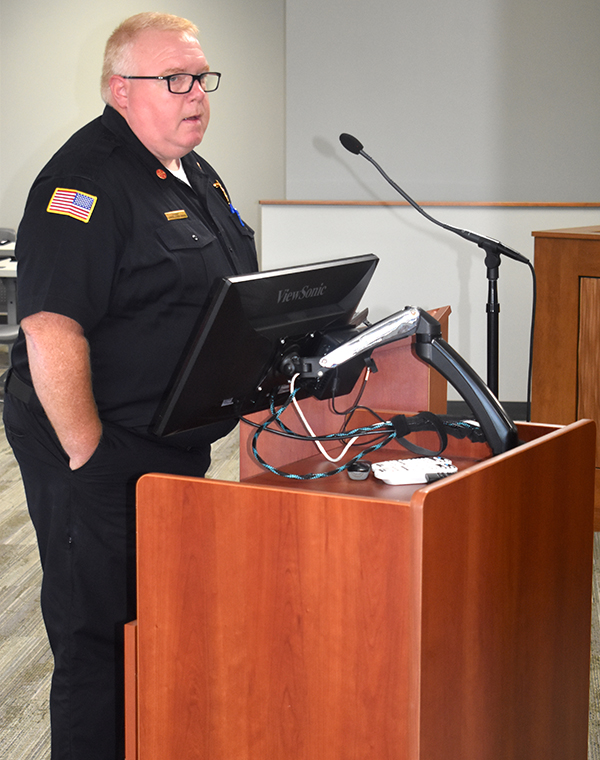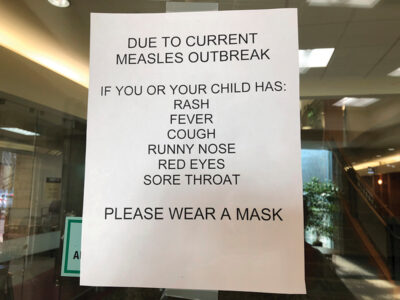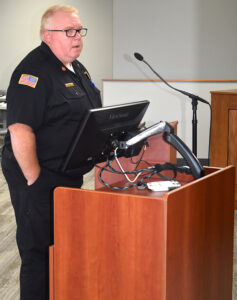Council agrees to pay its share of EMS consultation

T-R PHOTO BY ROBERT MAHARRY — Marshalltown Fire Chief Christopher Cross discusses the proposed EMS consultation agreement with the city council during Monday night’s meeting. The council voted unanimously to pay half of the $59,750 cost, with the other half being paid by Marshall County.
A little over a month after discussing the future of EMS services in Marshall County with UnityPoint Health — Marshalltown Hospital Administrator and Executive Director of Operations Shari King, the Marshalltown city council voted unanimously to approve a resolution authorizing the use of Local Option Sales Tax (LOST) dollars to fund a professional services agreement with Iowa EMS Consultants for an emergency medical services consolidation feasibility study and implementation plan during Monday night’s meeting.
Marshalltown Fire Chief Christopher Cross addressed the council about the resolution and noted that the city and county would share the cost, which is estimated at $59,750. The city’s portion, according to the wording, is $29,875.
“This is an agreement that will initiate a professional study by the consultant group to study and get information from all stakeholders and develop what the EMS system can look like in the future and how it would be implemented considering all demographics and financial implications from EMS as an essential service, legislation, ambulance billing and so on and so forth,” Cross said.
There were no questions from councilors, and during the public comment period, Tim Bradbury asked if the public would have the opportunity to address the concerns during the course of the study. He felt that UnityPoint had “created” the problem by moving the hospital from its former downtown location to the south edge of Marshalltown, therefore increasing transportation costs, and he described an EMS subscription service like one in Arkansas, where his father lives, as a potential option.
Cross responded that public meetings were probably “four or five steps down the road” but said they definitely want to hold information sessions and solicit input at some point in the future. He questioned, however, whether subscription-based services were legal in the state of Iowa. Councilor Mike Ladehoff then asked the chief if the consultants would provide “several scenarios” for moving forward once the study is complete.
“We’ve asked them to give us different options (and) under each option, to outline the logistical pathway to making that possible — who would be the authority having jurisdiction in administering the program, what it would look like for revenue coming from not only the different levels of legislative permissive levies for EMS as well as a project ambulance receipt billing type of financial outlook based on the number of runs that currently exist in the Marshalltown/Marshall County area,” Cross said.
Marco Yepez Gomez commented that the EMS issue had him “stumped” as he couldn’t find information that addressed his concerns specific to Marshalltown.
“The rhetoric around the issue seems to only be fixated on the county vs. how Marshalltown is specifically impacted, and I’m worried that the consultation will mirror that rhetoric and ignore crucial questions Marshalltown voters will be asking — questions like ‘Does Marshalltown itself have an ambulance desert?’ ‘Are Marshalltown residents specifically contributing to the UnityPoint deficit?’ ‘Is UnityPoint committed to stopping their service with Marshalltown soon?’ ‘What’s the feasibility for Marshalltown to have our own city ambulance service, and what’s the comparison of that vs. a countywide levy?'” he asked. “This issue of ambulance deserts is a federal issue or at most a state issue. For whatever reason, we’ve conditioned ourselves to be OK with these state and federal politicians to focus on irrelevant issues and pass the important issues to our vulnerable cities. I personally think it’s disgusting and incredibly dumb for the federal government to give nearly $170 billion to the DHS a few weeks ago, meanwhile letting their rural Americans starve and looking at their nearest, most productive town to fix their healthcare issues.”
Even $1 billion, he added, would go a long way toward addressing EMS issues like the ones Marshalltown and Marshall County currently face. Lonnie Hogeland then told the council the city and the hospital should work hand in hand to develop an agreement that works great for both parties, and he commended Police Chief Chris Jones for assisting him with a tow at 4 a.m. over the weekend.
Returning to the podium, Cross told the council that EMS is not currently designated as an essential service in Marshall County, and the service has operated on “a handshake level” in Marshalltown since its inception “through the kindness of the hospital.” There is no formal agreement or contract in place other than a transport agreement that requires patients to be taken to the hospital after a 911 call if necessary.
“There’s no level of care guaranteed. There’s no time standards. There’s no metrics to measure effectiveness,” he said. “When we understand that, we want to make sure that if something happens catastrophically to the EMS system in Marshall County, we want to have a solution proactively loaded and make sure that everybody is spun up on what the situation is, number one, what we’re doing about it, number two, and so that they’re all informed so that when it’s time for us to make a decision, we can do that with relative certainty.”
Mayor Joel Greer, who serves as the secretary of the UnityPoint Foundation, thanked UPH for taking over the hospital after it declared bankruptcy under its former name, Central Iowa Healthcare, in 2016. He felt the downtown building was too big and too unwieldy to heat and cool, and he praised UPH for constructing the new facility.
“Now that it’s UnityPoint, they have no duty to do anything with the old site that they had, and frankly, if they’re losing $1 million a year, it doesn’t make any business sense for them to continue to provide ambulance services because they have no requirement to do so,” he said.
While expressing regret that UPH no longer offers OB delivery services, Greer hoped that residents would realize it’s a widespread problem across the state of Iowa. The council then voted unanimously to approve the resolution funding half of the study.






